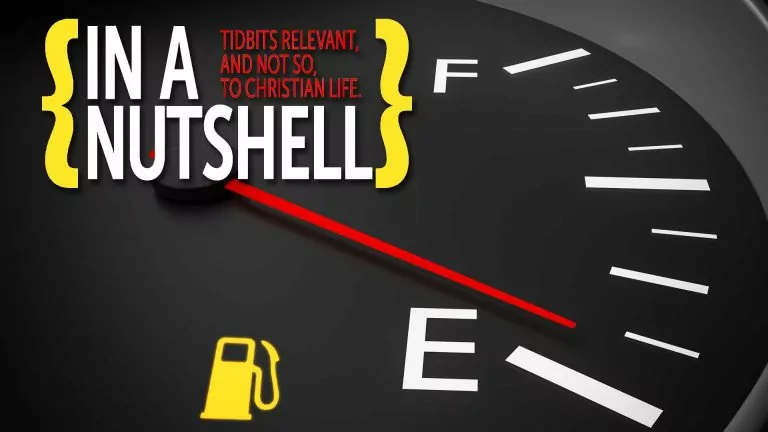Move just one stick to fix the equation
I thought there were three right answers, but after posting a version of this to Facebook, friends helped uncover three more. So there are at least 6…but 3 of them include what could be consider “cheats” (that’s a hint). You can find the answers at the bottom of this post.

Reformed one-liners worth unpacking
On the “Reformed Pub” Facebook group, member Matthew Mannucci started a discussion about “famous one liners” from some more recent Reformed leaders and he started things off with the first one below. Most of the offerings were not self-explanatory so a brief bit of context is provided but if your curiosity is sparked, be sure to google them. While these gentleman all have their different strengths and weaknesses, the sermons and conversations that spawned these one-liners are gold.
- “What’s wrong with you people?” – R.C. Sproul, in response to the question “Since God is slow to anger and patient, then why when Man first sinned was his wrath and punishment so severe and long lasting?”
- “I don’t know why you’re clapping; I’m talking about you.” – Paul Washer to a youthful audience that doesn’t understand he is admonishing them. Tim Challies gives his 10-minute take here.
- “Steal his wallet.” – R.C. Sproul on how to respond to someone who says there is no such thing as sin.
- “Jesus wants the rose!” – Matt Chandler on who could ever want a broken, almost pedal-free rose that a pastor was using to represent anyone who had been sexually impure.
- “It is better to lose your life than to waste it.” – John Piper
C.S. Lewis on the problem with materialism
“If the solar system was brought about by an accidental collision, then the appearance of organic life on this planet was also an accident, and the whole evolution of Man was an accident too. If so, then all our present thoughts are mere accidents – the accidental by-product of the movement of atoms. And this holds for the thoughts of the materialists and astronomers as well as for anyone else’s. But if their thoughts – i.e. of materialism and astronomy – are merely accidental by-products, why should we believe them to be true? I see no reason for believing that one accident should be able to give me a correct account of all the other accidents. It’s like expecting that the accidental shape taken by the splash when you upset a milkjug should give you a correct account of how the jug was made and why it was upset.”
– C.S. Lewis, God in the Dock: Essays on Theology and Ethics
Glorying in ignorance
When Charles Spurgeon met a fellow proud to be an agnostic, the preacher used a quick bit of translation work to illustrate how strange it is to be prideful on this point.
One walking with me observed, with some emphasis, “I do not believe as you do. I am an Agnostic.”
“Oh,” I said to him. “Yes. That is a Greek word, is it not? The Latin word, I think, is ignor’amus.”
He did not like it at all. Yet I only translated his language from Greek to Latin. These are queer waters to get into, when all your philosophy brings you is the confession that you know nothing, and…enables you to glory in your ignorance.”
– “The rowers have brought thee into great waters” preached Dec. 12, 1886
Stewardship at the gas pump
For years now the site GasBuddy.com has been helping thrifty folks in Canada, the US, and Australia find the best local prices for filling up our vehicles.
Clarity can come from closeness
When faced with any big decision Christians will pray for clarity because it becomes so much easier to take even very difficult tasks when we know that, yes, this is something we really should be doing.
But how does God provide that clarity? In a blog post on fostering children, Jason Johnson (JasonJohnsonBlog.com) shares how clarity can come by moving closer.
“Sometimes our prayers for more ‘clarity’ are answered with a call for more proximity. From a distance we say, ‘God show me the way!’ and He responds with, ‘Just move closer and you’ll see.’ And a lot of your questions about fostering are only answered through this kind of proximity. The closer you get the more you see and the clearer things become. You begin to see things you can never unsee, hear things you can never unhear, know things you can never unknow and then suddenly, nothing can ever be the same again. You simply cannot pretend it doesn’t exist anymore. “
Science’s “sliding scare of trust”
“Science” is often brought into discussions to end them. Whether we’re talking about overpopulation, or global warming, or evolution, or now the efficacy of masks and lockdowns, science will be invoked to declare that this or that is so, and that only “deniers” would say otherwise.
What this mike-drop trades on is the reputation science has garnered via some of its greatest hits: cars, smartphones, heat pumps, microwaves, flat screen TVs, laser-eye surgery, gluten-free pizza, and so much more. The great and glorious “science” has given us much, so who would be foolish enough to question it?
But wait just one moment: there’s science and then there’s science. In the Creation/Evolution debate a useful distinction is made between operational science and historical science. Discovering a good gluten-free pizza is all about the former: endless experimentation, and then, when one proves successful, duplicating that same experiment time after time. That’s where the reliability comes in: it is based on repeated experimentation – repeated checks – that can verify whether something is right or not. In contrast historical science is about events that can’t be repeated, like the origins of the universe, or the Earth, or Man. So, this sort of science is very different…and doesn’t deserve the same sort of respect.
What Paul Price and Robert Carter call science’s “sliding scale of trust” is also relevant in modeling big events going forward too. It’s one thing to say we’ve discovered a good gluten-free pizza dough (and really, have we even achieved that yet?) and quite another to say we understand what the weather will be like one hundred, or even ten year hence. To explain just how uncertain such conclusions really are, Price and Carter quote from Michael Crichton’s book Jurassic Park where a key character, mathematician and philosopher Ian Malcolm illustrate that uncertainty:
“Chaos theory says two things. First, that complex systems like weather have an underlying order. Second, the reverse of that—that simple systems can produce complex behavior. For example, pool balls. You hit a pool ball, and it starts to carom off the sides of the table. In theory, that’s a fairly simple system, almost a Newtonian system.
“Since you can know the force imparted to the ball, and the mass of the ball, and you can calculate the angles at which it will strike the walls, you can predict the future behavior of the ball. In theory, you could predict the behavior of the ball far into the future, as it keeps bouncing from side to side. You could predict where it will end up three hours from now, in theory…
“But in fact … it turns out you can’t predict more than a few seconds into the future. Because almost immediately very small effects—imperfections in the surface of the ball, tiny indentations in the wood of the table—start to make a difference. And it doesn’t take long before they overpower your careful calculations. So it turns out that this simple system of a pool ball on a table has unpredictable behavior.”
If we have to be humble about where the pool balls will land, then we should know that even more humility is in order when dealing with systems or situations that are far more complex.
SOURCE: Paul Price and Robert Carter’s Creation.com article: “Historical Science, Chaos Theory, and the sliding scale of trust” posted Oct. 1, 2020
Sound to sooth the savage baby breast
When a baby would wake in the middle of the night, and nothing seemed capable of soothing her, I had one go-to trick that could. I’d boot up my computer and head to SimplyNoise.com, a site that offered different sorts of soothing noises that, when paired with a soothing backrub from dad, would send the little one off to sleep.
That site used to be free and while it is no longer, I ran across another that is: Noises.online offers the sounds of crackling fires, calm rainstorms, babbling conversation, straight white noise and many more that you can even combine with one another. If you have a kid just cracking their first tooth, I highly recommend it!
Answers to “Move just one stick to fix the equation”
The first three below are the “easy” ones, and the next three required some serious thinking outside the box.
- 0+4=4
- 8-4=4
- 5+4=9
- 5+4≠4
- 9-4≠4
- 9-Y≠4
H/T to Martha DeGelder












